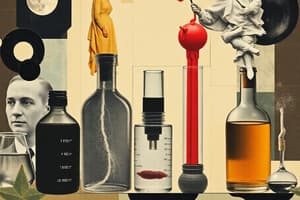Podcast
Questions and Answers
What is the purpose of the scientific method?
What is the purpose of the scientific method?
- To provide scientific explanations for questions about the world (correct)
- To document historical events
- To promote religious beliefs
- To create fictional stories
What is the role of background research in the scientific method?
What is the role of background research in the scientific method?
- It promotes bias in the experiment
- It has no impact on the experiment
- It helps the scientist form a hypothesis (correct)
- It creates obstacles for the scientist
What is a hypothesis in the context of the scientific method?
What is a hypothesis in the context of the scientific method?
- A belief based on superstition
- A proposed explanation that can be empirically tested (correct)
- A random guess without any basis
- A religious doctrine
What does an experiment provide in the scientific method?
What does an experiment provide in the scientific method?
What is empirical data in the context of the scientific method?
What is empirical data in the context of the scientific method?
Who is credited with the first documentation of the scientific method?
Who is credited with the first documentation of the scientific method?
What is the first step of the scientific method?
What is the first step of the scientific method?
What should a scientist do after asking a question in the scientific method?
What should a scientist do after asking a question in the scientific method?
What comes after conducting background research in the scientific method?
What comes after conducting background research in the scientific method?
What is important when designing an experiment in the scientific method?
What is important when designing an experiment in the scientific method?
What should be done after collecting data in the scientific method?
What should be done after collecting data in the scientific method?
What determines if the differences observed in the data are truly due to the independent variable in the scientific method?
What determines if the differences observed in the data are truly due to the independent variable in the scientific method?
What is the purpose of an experimental design?
What is the purpose of an experimental design?
What is the difference between a scientific law and a scientific theory?
What is the difference between a scientific law and a scientific theory?
What is the purpose of formulating a hypothesis?
What is the purpose of formulating a hypothesis?
What role does the control group play in an experiment?
What role does the control group play in an experiment?
Why do scientists use existing theory to create a good experiment?
Why do scientists use existing theory to create a good experiment?
What is the first step in the experimental design process?
What is the first step in the experimental design process?
What is the next step if the data supports the hypothesis?
What is the next step if the data supports the hypothesis?
What is the purpose of peer review in the scientific method?
What is the purpose of peer review in the scientific method?
What should scientists do if they want to avoid bias in their experiment's results?
What should scientists do if they want to avoid bias in their experiment's results?
What happens once a hypothesis has been supported by a significant amount of peer reviewed experiments?
What happens once a hypothesis has been supported by a significant amount of peer reviewed experiments?
What is the purpose of retesting the data if it supports the hypothesis?
What is the purpose of retesting the data if it supports the hypothesis?
What does bias in forming a hypothesis impact most significantly?
What does bias in forming a hypothesis impact most significantly?
What is the purpose of conducting experiments under the same conditions and only changing the independent variable?
What is the purpose of conducting experiments under the same conditions and only changing the independent variable?
Why do many science vocabulary terms become increasingly difficult to understand?
Why do many science vocabulary terms become increasingly difficult to understand?
What is the significance of using Greek and Latin words in scientific terminology?
What is the significance of using Greek and Latin words in scientific terminology?
How do morphemes contribute to understanding common science terms?
How do morphemes contribute to understanding common science terms?
Why is it important for scientists to be familiar with the root, prefix, or suffixes of scientific terms?
Why is it important for scientists to be familiar with the root, prefix, or suffixes of scientific terms?
What is the purpose of creating a good experiment for science?
What is the purpose of creating a good experiment for science?
What is the suffix of the term 'biology' and what does it mean?
What is the suffix of the term 'biology' and what does it mean?
What does the prefix 'hydro-' refer to?
What does the prefix 'hydro-' refer to?
What does the suffix '-cephalus' refer to?
What does the suffix '-cephalus' refer to?
What are the three main word parts of a word?
What are the three main word parts of a word?
What does the prefix 'phago-' translate to?
What does the prefix 'phago-' translate to?
What does the suffix '-osis' refer to?
What does the suffix '-osis' refer to?
What type of learner prefers learning by hearing new information?
What type of learner prefers learning by hearing new information?
What type of learner benefits from looking at pictures or charts to understand new material?
What type of learner benefits from looking at pictures or charts to understand new material?
What is the definition of physical properties of matter?
What is the definition of physical properties of matter?
What happens when a particular type of matter changes state from solid to liquid?
What happens when a particular type of matter changes state from solid to liquid?
Flashcards are hidden until you start studying




